#Faith Free Presbyterian
Text
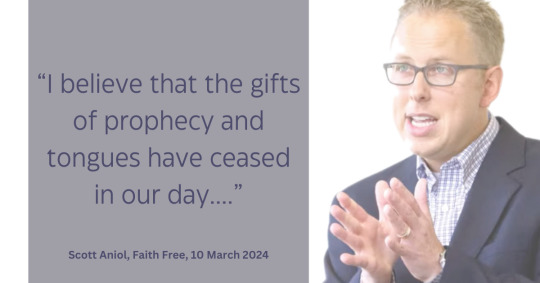
In the evening service, Aniol leaps off from I Corinthians 14. You know the passage (3:46):
Now here we have a passage of scripture dedicated to discussion of prophecy and tongues, and these are hot button issues and and often maybe one of the reasons we we don't typically look at this chapter to discern what Paul is, is teaching us regarding the nature of corporate worship.
I believe that the gifts of prophecy and tongues have ceased in our day, and so sometimes we who believe that might be tempted to think, "well then this chapter doesn't have anything to teach us," but far from it, because the reasons that Paul gives to the Corinthian church for why believers should desire prophecy over tongues in corporate worship. The reasons that he gives for that actually help us to profoundly understand the nature and the purpose of corporate worship.
So just so we all understand each other, Scott, you're not taking this passage as it is intended. You're taking this passage for what you want it to say.
Just sayin'.
#Bob Jones University#Faith Free Presbyterian#Scott Aniol#Make BJU Aniol Again#The End is Near#Hard turn to the right#Everything old is New again
2 notes
·
View notes
Text
youtube
My problem? You don't have enough time for all those LOL. 😃 Fact is it's not the circumstances we encounter, & there always will be some, it's how we have become able to preserve & engage with & about those circumstances that speaks of the Mature Adults we have become. The things that are overwhelming, that's when it's better to look upward than at them or around us. There are many things We have to Leave At The Foot of The Cross.
I like what Saint Francis Prayed, Lord, Make Me an Instrument of Your Peace
Where There is Darkness, Let Me Sow, LIGHT. Where there is Sadness, HOPE. Where There is Despair, HOPE. Where There is Injury, PARDON. Where There is doubt, YOUR FAITH FATHER. Where There is dysfunction, Your Salvation LORD. We're There is Corruption Lord, Your TRUTH. For we have Learned Lord It Is in Giving that We Receive. Pardoning that We Are Pardoned. It Is Dying To This World, That We Are Born To Eternal Life With YOU LORD. May Your Will Be Done here on Earth, As It Is I Heavenly Realms.
Change In Me What Will Make Me, I Pray Lord, What All will Make Me More Like You. How I Think, How I Speak, How I Feel, How My Intentions Are For Another. May They All Astound To The One That Lives Inside This Perishing Shell of Nature.
I Love You Lord, Let Others know that by What proceeds From Me I make That My Commitment While Being Suited in The Full Armor of GOD DAILY. Being of a Renewed Mind & Strengthened Spiritual Powers In Jesus Majestic, Holy, Grace Filled & Never Ending LOVING NAME....
FALCON... Better Tomorrow's...
PEACE 🙏🤠 👍 🤟
#Better Tomorrow's#Truth#Christ#Jesus Christ#GOD#so hot 🔥🔥🔥#BTSP#BTEM#BetterTomorrows#SET FREE CHURCH#Hollywood Presbyterian Church#HOPE#GRACE#REDEMPTORIST CHURCH#First Baptist Church#FAITH Believeers God's House#Native American Church of The Living GOD#Native American People#spiritual awakening#spirituality#Youtube
1 note
·
View note
Text
Hiiiii as a queer person living in the Bible Belt of the USA, I’m envisioning a “Christian trauma AU / general theology AU” because you know my main focus is always Sanji. This assumed that we’re in the USA, modern era, and I guess maybe a college or post grad AU for how they meet each other? This is a lonnnnnnnng text post so scroll at your own risk. To keep it from being toooo long I’m also sticking to east blue crew.
Hear me out:
There are a million different sects of Christianity so we’ve got a ton of angles to use.
Garp is catholic (but think FRENCH laïcité instead of American Amy Coney Barret Supreme Court justice weird catholic cult), Dragon straight up rebels against the strict structure and goes about his atheist ways. Neither of them really raise Luffy anyway so 💁🏻
Luffy ends up being agnostic. It’s not that he doesn’t believe in a higher power but he knows he needs to take action and that he can’t rely on a higher power to fix the problems of the world. Very Albert Camus, revolting against the absurd and holding himself to a higher responsibility in life
Zoro comes from a Shinto or Buddhist background. He’s not judging anyone’s religious beliefs unless they’re harming others.
Nami has religious trauma from the Baptist church that set up in her town and made it impossible to be herself. Belle Mere is so clearly queer and she’s harassed and dies at the hands of some zealous bigots who were emboldened by the words of the local Baptist church pastor (Arlong)
Ussop comes from a chill Protestant background (maybe Presbyterian?) But he’s more of a CEO (Christmas Easter Only) in terms of actually attending any sort of church. Honestly, with his dad out of the picture and his mom dying, he just had bigger things on his mind like living every day.
Finally, Sanji. Oh boy, Sanji has major “Quiverfull movement Christian” trauma from Judge. For those who don’t know, quiverfull is a Christian extremist movement where the idea is to have as many kids as possible and adhere to very strict purity rules and gender roles. Contraception isn’t allowed. Women wear long skirts and non fitted shirts to hide their womanly form (ew), and most of the time these parents homeschool there kids to avoid the “temptation” or “impurity” of modern society.
Judge had these 5 kids who he’s raised in this faith but Sanji never liked how Judge treated his mom. Why was Sora supposed to be “seen and not heard?” Why was it ok for his brothers to use scripture to bully and hurt and spread hate? Why would a loving god create women just to subjugate them? Judge wouldn’t like this, and once Sora passes away (probably because Judge wouldn’t let her seek medical care post birth of the quadruplets, so her health deteriorated for years), Judge locks him up and makes him do all sorts of horrible “prayer” and “repentance” practices, which are really just abuse.
Sanji would maybe escape when they go into town to get something mundane like a printer or a new wifi router (which only judge is allowed to use the internet). He’d probably bolt first chance he gets and when he meets Zeff, Zeff can recognize the signals of abuse. He takes Sanji in and even though Sanji never believed women were less than men, he still has years of trauma and gender roles beaten into him that he has to unpack.
His choice to cook? That’s a huge rebellion. Wearing tight fitting suits that look sinful? That’s a middle finger to his dad. He always treats women like goddesses because he feels so much guilt for the sins of his father. When he finally joins the Strawhats, he’s so overwhelmed with how free and nonjudgmental they are (of important stuff, obviously they’ll still poke fun at small stuff) that he feels comfortable dropping little comments here and there, opening up.
Ussop will be comforting Nami about something and sanji will tell him is so refreshing to see a man be so nurturing. He goes to Ussop often, asking how he’s so confident sharing his emotions.
Nami will be ordering them around and he’ll do everything she says with a smile, just happy to see her free to do what she wants (which is be a bossy bitch)
Zoro will talk about Kuina one night and Sanji will sob, overwhelmed with joy that she got to have all that strength and a friend like zoro even when faced with hurtful gender expectations.
Luffy above all is the most jarring for him. He grew up hearing about sin and sinners and temptation and evil but when he sees Luffy doing his thing, taking down bad people, fighting for the underdog, he knows that if there is a God (he she it they? Who cares), Luffy is doing their work.
——————
Bonus Gay Cherry on top is that Sanji meets Iva and gets into drag, starts performing, does some events, and through that gender liberation is able to find some peace in who he is, tucking away all the hate he was born into. And he ends up with zoro the end bye
#too long don’t read#one piece christian trauma au???#east blue crew au text post#black leg sanji#monkey d luffy#east blue crew#one piece#text post#cat burglar nami#god usopp#sanji#roronoa zoro
26 notes
·
View notes
Text
Gays in and out of the LDS church
I am all in for LBGTQA+ people who stay in the LDS church and those who decide to leave. I am a gay man who decides to stay in. I understand and support my children and grand children who left because it was not meeting their needs and they did not feel safe or comfortable at church. I love and support my queer friends on social media and through zoom meetings. My heart aches for those who were raised in the church and express the pains and anguish they went through from what was said from the pulpit and what was said by members. I know with every ounce of my being that I am loved by Heavenly Father and Jesus Christ as I am. They created me and they have no qualms about their love for me. Currently I am unable to sort out why Prophets and Apostles say hurtful things about me and what will happen to me in the after life. I cling to true doctrine and those who profess it. I do not have the answers to my or others concerns . I just have faith that God will find me acceptable in His presence.
The other reason I am writing this is that I have a concern about those who have left the church. I was a Methodist by birth and through my teen years, then an Episcopalian and a Presbyterian as an adult. I left those churches and I had good reasons to leave. But I do not hate them or feel the need to fight against them. They helped shape who I am. I hope that people who leave the LDS church can leave it and move on. The posts I read here and Reddit and other places are full of anger and pain. It must be difficult for people to move on and free themselves from the pain they experienced. Perhaps, their families are still active and they have to endure LDS faith culture crap in order to continue relations with loved ones. There may be other valid reasons for the continuing attacks on the church and its' leaders. My concern is that the emotional turmoil may be wearing people down. I think it might be healthier to find another way to express feelings and to be rid of the turmoil. At least I hope there are ways for that to happen. I support my friends who have left the church, by listening to their concerns and loving them where they are in their struggles. I hope that helps them get through a difficult challenge. My prayers are for all of us to find our path back to Heavenly Father in a way that feels safe and affirming and right.
15 notes
·
View notes
Note
whats the belfast society?
Ok so to understand the Belfast Society one first needs to understand a few things about eighteenth century Irish Presbyterianism: one, that it was very very very very centred around the idea that Christ is the only one with any right to legislate on religion, i.e. that the Bible is not only the only guideline for Christianity, but that if you deviate from the letter of the Bible at all you are Doing It Wrong. This led to a tradition of free thought within the church but also, to paraphrase historian Ian McBride, left the official Synod wide open to harassment from various groups on the grounds that the Synod was misinterpreting scripture in some way and therefore perverting true Christianity. Two, as contradictory as it may seem, the Synod also only tolerated dissent and "heresy" from both ministers and the laity up to a point; they were not above going scorched earth on someone for disagreeing with them too much. Three, like many other major Christian sects at the time, they regarded the belief that Jesus and God are not the same being who form 2 parts of 1 trinity but totally separate, which is common among Unitarians and Arians, as heresy. This will become important in a moment.
The immediate story of the Belfast society starts with an English Presbyterian minister who became the minister of the Wood Street congregation in Dublin in 1702 by the name of Thomas Emlyn. People liked Emlyn, but it didn't take his parishioners long to notice that he never talked about the aforementioned trinity doctrine, which was really odd, and made them suspicious, because Unitarianism was in the air and a number of major religious authorities were screaming + crying + throwing up about it. So one of his parishioners asked him outright: did he believe in the idea of the trinity? And Emlyn said no.
Immediately, Emlyn was called before the Dublin Presbytery. They exiled him, he (outraged because only Jesus was supposed to be able to legislate like that in the church) compared them to the Pope, they threatened to come after him if he ever took up preaching again. A pamphlet war ensued. Eventually, Emlyn was thrown in prison. He stayed there for 2+ years until one of his friends intervened and liberated him.
Cut to Ulster. It was now 1705 and the Ulster Synod was also nervous about heresy. So worried, in fact, that they decided to institute something called the Westminster Confession of Faith, which is essentially a (really, really long) list of basic Christian beliefs a prospective minister would need to agree to in front of the Synod before he could be ordained, even if a congregation had already asked him to become their minister. Predictably for a group of people whose whole thing was no earthly authority on religion but Thee Bible, many Presbyterian ministers in Ulster immediately took exception to this. One of them was a man called Rev. John Abernathy, of the First Presbyterian Church in Belfast, and he was so upset that he founded a group for like-minded ministers and laypeople who liked philosophy and hated the Westminster Confession called the Belfast Society.
To quote historian ATQ Stewart, "The Society devoted itself to consideration of the scriptural terms of the unity of the Christian Church the nature and mischief of Schism, the rights of conscience and private judgement, the sole dominion of Christ in His Kingdom, and other subjects of that kind." They studied and debated on the Bible, talked about what they were reading outside of meetings, and generally generated a lot of talk and ideas that certain orthodox Presbyterian writers would malign for centuries afterwards. Like an extremely Presbyterian debate club, really. Additionally, a lot of big names in the New Light controversy of the 1720s (which is a related but different story), including Samuel Haliday, Samuel Dunlop, Abernathy himself, etc, were members of the Belfast Society first. Thomas Drennan, father of William Drennan, was friends with nearly everyone involved. Through Drennan and through the way they influenced the outcome of the New Light controversy, one might say that they actually influenced modern Belfast a fairly significant amount!
Sources beneath the cut
McBride, Ian. Scripture politics : Ulster Presbyterians and Irish radicalism in the late eighteenth century. Clarendon Press, 1998.
Stewart, Anthony Terence Quincey. A deeper silence : the hidden roots of the United Irish movement. Faber & Faber, 1993.
Whelan, Fergus. Dissent Into Treason: Unitarians, King-killers and the Society of United Irishmen. Brandon, 2010.
Whelan, Fergus. May Tyrants Tremble: The Life of William Drennan, 1754-1820. Irish Academic Press, 2020.
12 notes
·
View notes
Text
For @rabbits-of-negative-euphoria
The fate of animals after their death is unknown, and not specified by the Bible. My best evidence is this verse in Ecclesiastes 3:20-21:
All go to one place. All are from the dust, and to dust all return. Who knows whether the spirit of man goes upward and the spirit of the beast goes down into the earth?
Obviously this doesn't tell us much. This was before the time when much had been revealed about the afterlife of humans. In the New Testament we learn much more about what awaits humans after death, but the fate of animals is not so revealed.
However, what we can gather from this passage is that an animal has some sort of spirit. It may not be like a human spirit at all, but apparently still qualifies for use of the word. Before you get ahead of me, obviously animals do not have the Imago Dei like humans do, and were not even created on the same order as humans or to have the same spiritual capacities.
In the Bible the word "spirit" is also used as "breath", and we see higher animals described as having this sort of spirit in Genesis:
Genesis 6:17
For behold, I will bring a flood of waters upon the earth to destroy all flesh in which is the breath of life under heaven. Everything that is on the earth shall die.
and likewise in 7:22.
Now for your claim that it is quite enough for animals to have their short and limited existence, perhaps you can assume that when you are thinking about pets and their nice cushy life, but many animals live a short and quite horrible life, suffering the whole time, and then die brutally. All of this is by no fault of their own since animals don't have the capacity to sin against God.
The Bible makes it clear that animals suffer from the effects of a fallen world brought on by humanity, since we are - as it were - (and i know this imagery will appeal to you as a Presbyterian even more than it does to me) its covenant heads.
With that in mind I fail to see how Romans 8:22 can be referring to anything else.
For we know that the whole creation groaneth and travaileth in pain together until now.
And before you say, "well, Evelyn, even the plant world suffers from humans' evil, but no one would claim that trees have spirits."
Trees don't think or feel, but animals do. I simply choose to have faith that God didn't lie to us in creating the material world, and when an animal seems to be aware and feeling; it really is to the degree that it appears to be, rather than as a cleverly designed automaton. To say otherwise is a form of faithlessness and even solipsism I might argue.
So what else does Romans 8 say about the creation?
For the creation waits with eager longing for the revealing of the sons of God. For the creation was subjected to futility, not willingly, but because of him who subjected it, in hope that the creation itself will be set free from its bondage to corruption and obtain the freedom of the glory of the children of God.
Clearly then there are other parts of the creation besides man, which are waiting eagerly for God to reveal a new humanity in future glory. Once their covenant heads are redeemed, they get to tag along. And the generations of breathing, bleeding, feeling animals who have suffered since the fall hardly seems the least important among the things that were created. It hardly seems like they would be left out of this.
But I don't necessarily hold this view dogmatically. It just gives me hope that God cares about the least of his creatures.
41 notes
·
View notes
Text
Queer & Here to Stay! Pride month text prayers
Sup y’all! I’m a board member for More Light Presbyterians, and this Pride month, June 2023, we’ll be sharing short daily prayers with all who sign up to receive them via text.
The prayers will center around our theme for the month, “Here to Stay!” — a defiant celebration of how queer folk have always existed in our faith communities and always will.
If you’re interested in receiving these daily prayers, fill out this form — be sure to provide your phone number and check in the box that reads “I would like to receive daily text prayers in June.”
(You’ll notice that the form also has options to receive some liturgy + rsvp for a virtual service; feel free to say yes or no to those!)
I look forward to praying with you! May we remember always that queer & trans folk are beloved by the God who made us, just as we are <3
#here to stay#pcusa#queer christians#faithfullylgbt#prayer tag#sorry the form looks so unprofessional algja;lkgjdada we are currently all volunteers BUT!!!#we JUST hired a new director of engagement!!!#we're back in business baby!!!#so soon shit will look more legit again#avery speaking
55 notes
·
View notes
Text
Come to Virtual Queer Worship,
Sunday evening on June 25!
More Light Presbyterians' Pride month worship service is this Sunday on Zoom at 7pm EST / 6pm CST!
The service theme is "Here to Stay," a defiant celebration of queer people of faith. We've always been here, we have vital gifts for our faith communities, and we aren't going anywhere.
Feel free to reblog this, and/or invite others off tumblr whom you think might be interested.
If you would like to come, message me and I'll give you the Zoom link. Hoping to see you there!
#faithfullylgbt#affirming churches#more light presbyterians#church online#queer christians#log#summer 2023#I wrote the liturgy and it's pretty good#if I do say so myself :3
29 notes
·
View notes
Photo
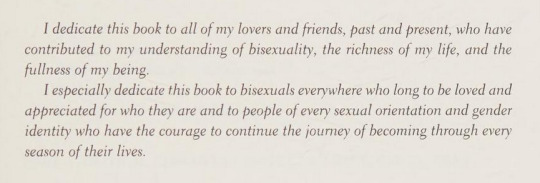
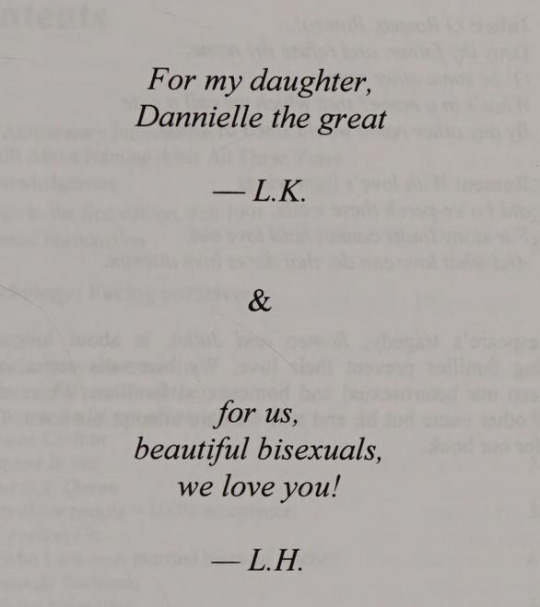



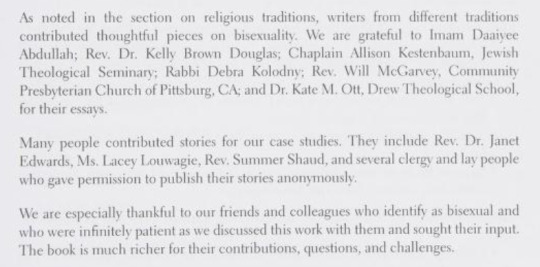
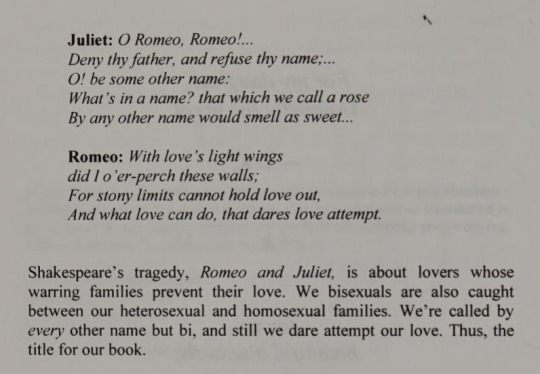
Dedications and excerpts from prefaces from books on bisexuality that are avaliable for free on the Internet Archive (links in transcripts).
Transcripts for text in images:
Becoming visible : counseling bisexuals across the lifespan - I dedicate this book to all of my lovers and friends, past and present, who have contributed to my understanding of bisexuality, the richness of my life, and the fullness of my being. I especially dedicate this book to bisexuals everywhere who long to be loves and appreciated for who they are and to people of every sexual orientation and gender identity who have the courage to continue the journey of becoming through every season of their lives.
Bi any other name : bisexual people speak out - For my daughter, Danielle the great - L.K & for us, beautiful bisexuals, we love you! - L.H.
Bisexual politics : theories, queries, and visions - To the memory of David Lourea, who inspired the revolutionary in so many of us, and to all those who have struggled and put their lives on the line so that we could come out and be free, with pride, rage, sisterhood, and love.
Bisexuality : the psychology and politics of an invisible minority - Dedicated to bisexual people everywhere - Come out, come out, wherever you are, It it our time to dance!
Bisexual women in the twenty-first century - To my son Rowan and the children of my community of lovers. To the possibilities that we have opened and that they will take in directions of which we have yet to dream.
Bisexuality : making the invisible visible in faith communities - As noted in the section on religious traditions, writers from different traditions contributed thoughtful pieces on bisexuality. We are grateful to Imam Daaiyee Abdullah; Rev. Dr. Kelly Brown Douglas; Chaplain Allison Kestenbaum, Jewish Theological Seminary; Rabbi Debra Kolodny; Rev. Will McGarvey, Community Presbyterian Church of Pittsburg, CA; and Dr. Kate M.Ott, Drew Theological School, for their essays.
Many people contributed stories for our case studies. They include Rev. Dr. Janet Edwards, Mc. Lacey Louwagie, Rev. Summer Shaud, and severl clergy and lay people who gave permission to publish their stories anonymously.
We are especially thankful to our friends and colleagues who identify as bisexual and who were infinitely patient as we discussed this work with them and sought their input. This book is much richer for their contributions, questions and challenges.
Bi any other name : bisexual people speak out - Juliet: O Romeo, Romeo! Deny thy father, and refuse thy name... O! be some other name: what’s in a name? that which we call a rose by any other name would smell as sweet.
Romeo: With love’s light wings did I o’er-perch these walls: For stony limits cannot hold love out and what love can do, that dares love attempt.
Shakespeare’s tragedy, Romeo and Juliet, is about lovers whose warring families prevent their love. We bisexuals are also caught between our heterosexual and homosexual families. We’re called by every other name but bi, and still we dare attempt our love. Thus, the title for our book.
#bisexuality#bisexual history#queer history#bisexual#bisexual theory#queer theory#bi pride#bisexual pride
215 notes
·
View notes
Text
okay this is going to be a genuinely unpopular take about religion so if you click through, read, and get offended, that’s gonna be on you
The number of people in my generation who I meet and who say they “hate organized religion” or “could never believe in God” or “think Christianity is stupid”
- and then give, as their reason, some dumbass shit someone did or said when they were a kid in Sunday school -
genuinely and severely irritates me.
Like, okay. Humans have been creating and engaging in spiritual rituals since FOREVER. This is an ancient and sacred part of who we are. There are thousands of years of art, writing, philosophy, and community on this topic.
And you’re going to let some random ass completely unqualified goober in 1998 define it in its totality for you?
Are you serious? You’re an adult. Take some responsibility for your own worldview.
I understand that children are very impressionable. A bad experience as a kid can have significant impact on us. But honestly.
And I’m not talking about deep spiritual trauma here. I’m talking about the dozens of stories I hear about poorly run or theologically shallow nonsense from children’s programs that people cite decades later as reasons for their entire posture toward faith. Absurd.
I had a shit time as a kid in Talmud Torah classes. Know what I did about it? I figured my own beliefs out. I looked into religion and tradition from my own perspective and developed a relationship to the Divine that wasn’t 100% conclusions drawn by an annoyed and pissed off fourth grader.
I believe religious institutions have a responsibility to provide better ministry to children rather than having it be whoever was free to volunteer for whatever. Clearly the model for children’s religious formation that my generation experienced was bogus.
But come on. You’re really gonna let some lady named Linda’s halfassed takes on Jonah and the Whale prevent you from engaging with the richness of human faith tradition? Do you really think one rando who bored you for an hour a week before you hit puberty is the best and singular representation of all religious thought?
Grow up. Read a book. Talk to more people. Visit a faith community in your area. I don’t care if you don’t develop a spiritual tradition afterwards but at least your perspective won’t be entirely based on Stucco Presbyterian’s poorly resourced pre-9/11 Kid’s Chapel program.
10 notes
·
View notes
Text
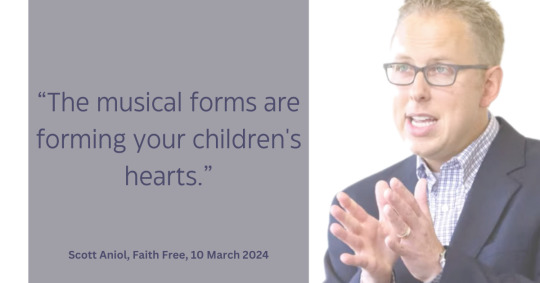
We knew Aniol would get to it. He wanted to drill down to say that musical forms are ... well, sacred.
And honestly, I personally don't disagree. But Scott is so prescriptive about it. Near the end he states (43:00):
Yes, that movie you let them watch might not have any swear words or immoral scenes, but does it have a subtle underlying message that teaches their hearts that they must love themselves above all, or that love is simply a romantic feeling that we fall in and out of? That's shaping their hearts?
Or you might only let your children listen to music with Christian lyrics. But does the musical style and instrumentation teach your children's hearts that love for God really is no different than romantic love?
Does a "child" even know romantic love? At all? In any way? This is so backwards.
The first love we all know is parental love. I mean we know it from before we're even breathing oxygen.
Why test children's understanding of love like you're doing? It's so plainly bizarre.
And then ... what does Aniol say in the evening?
#Bob Jones University#Faith Free Presbyterian#Scott Aniol#Make BJU Aniol Again#The End is Near#Hard turn to the right#Everything old is New again
2 notes
·
View notes
Text
Nine Things You Should Know About the Westminster Confession
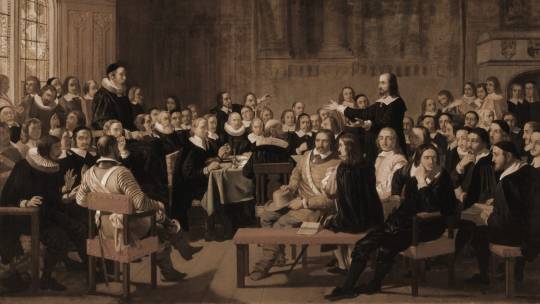
by John R. Bower
After nearly 400 years of service, the Westminster Confession of Faith continues to provide Reformed and Presbyterian churches worldwide a vibrant summary of Scripture’s principal teachings. But how has this document, drawn from a strikingly different age, remained equally relevant to today’s church?
In exploring this question, we consider nine essential elements of the Confession whereby the 17th-century Reformed church can be seen as standing arm in arm with the 21st-century church and beyond.
I. The Westminster Confession was designed as a doctrinal compass to keep the scriptural bearings of the church true, even when tossed by error and division. Civil war had thrown the Church of England into political, social, and ecclesiastical upheaval, and as its first step toward rebuilding the church, Parliament convened a national assembly of clergy to advise on the most scriptural guides for doctrine, worship, and government. Between 1643 and 1648, the Westminster Assembly of Divines created six separate documents for equipping the church anew, but of these the Confession of Faith was key. It alone expressed the mind of the church concerning the truths of Scripture and meshed the documents of worship and government into a unified working system.
II. From its inception, the Confession stood subordinate to the Word of God. In writing the Confession of Faith, the assembly remained passionately committed to the Reformation dictum of sola Scriptura, that Scripture alone speaks with final authority in all areas of faith and life. Indeed, the Confession’s statement “On the Scripture” is the document’s first and longest chapter. Here, Scripture is declared the inspired, infallible, sufficient, understandable, and the supreme judge of all disputes. Throughout the assembly’s work, members were oath-bound to affirm only those propositions supported by Scripture. Reflecting this commitment to the Word, the Confession’s 33 chapters bristle with more than 4,000 verses.
The Confession’s 33 chapters bristle with more than 4,000 verses.
III. In presenting the core truths of Scripture, the Confession followed a comprehensive and unified system of faith, reaching as far back as the Apostle’s Creed. Indeed, among the major Protestant confessions of the Reformation (Augsburg, Belgic, French, Second Helvetic), not only were the principle truths of Scripture held in common, but these doctrines were sorted into the same broad system of faith in God and duty to God. Following its creedal predecessors, the Westminster Assembly carefully preserved this doctrinal division of faith and service—a distinction the Shorter Catechism more expressively rendered as “what we are to believe concerning God” and “what duty God requires of man.”
IV. In its opening chapters, the Confession represents the heart of Reformed orthodoxy and historic Christianity. Here, the doctrines of faith emerge in three parts: God’s creative work and man’s fall (chs. 1–6), Christ’s work as Redeemer (chs. 7–8) and the Holy Spirit’s work in applying redemption (chs. 9–19).
V. The remaining part of the Confession (chs. 20–33) describes the believer’s responsibility to serve God, a service that embraces our neighbor, the state, and the church. The church, however, provides the principle venue wherein we serve God. Moving through chapters 25–31, the Confession elaborates on the doctrine of the church, the communion of the saints, the sacraments, and the far-reaching scope of church discipline. And culminating the saint’s life of service to God is entrance into the church glorious, described by the resurrection of the dead and the last judgment (chs. 32–33).
VI. “Of Christian Liberty and Liberty of Conscience” affirms how the individual believer’s conscience is free to serve Christ alone. But this freedom of conscience is further subject to those lawful civil and ecclesiastical authorities instituted by Christ. Balancing the several God-ordained authorities over conscience proved one of the assembly’s greatest challenges in framing the Confession, especially when faced with increasingly autonomous parishioners and competing civil and ecclesiastical claims of authority.
VII. The Confession offers a superlative platform for expressing consensus on the doctrines of Scripture and building unity within the church at large. When the Westminster Assembly labored to rebuild the church in the 17th century, England—like Scotland and many regions on the continent—recognized only a single church, making unity a societal as well as an ecclesiastical imperative. Today, although multiple denominations have replaced the single church model of the Reformation, the Confession retains its place in fostering unity within, and between, Reformed and Presbyterian churches worldwide.
VIII. Found within each of these nine essentials of the Confession is the centrality of Christ’s church. Guided by Scripture alone, the Confession affords a doctrinal anchor expressing the breadth of faith within the framework of the historic church. Saints are carefully guided in rendering their fullest service to God, especially within the visible church, where they are built toward unity in the one faith. In fact, while the Confession can be seen as enveloping all the great solas of the Reformation, it excelled in advancing the “forgotten sola” of sola ecclessia, the church alone.
While the Confession can be seen as enveloping all the great solas of the Reformation, it excelled in advancing the ‘forgotten sola’ of sola ecclessia, the church alone.
IX. The Confession was not intended to serve as a doctrinal storehouse, but to be communicated to every member of every church. The Larger and Shorter Catechisms were composed for this purpose. Thus, in writing its catechisms, the assembly kept an “eye to the Confession.” But this focus meant more than replicating content; the catechisms effectively conveyed the purposes of the confession, for as the principles of faith, life, and the church were taught and memorized, they built unity in the one faith from the ground up.
3 notes
·
View notes
Text
Free-write: Relationship with Religion
Suggested by @apollos-olives <3
Most of my life, I was very neutral on religion. My family was Christian by default, as it often is in the US. We didn't really go to church or pray before eating or talk about faith, we just passively identified Christian. My Nana (great-grandmother who did a lot of the raising me) was Presbyterian, some of my extended family is Catholic, some of my extended family is Jewish, my dad was Wiccan during my childhood, my mom's mom is Baptist. I didn't go to church, unless a babysitter or my mom's mom took me. The one time I can recall praying as a child was when I was 5, huddled under blankets asking God to protect me from ghosts (one of my biggest fears and biggest triggers of my psychosis).
However, when I got older, and learned more about other faiths and other people's relationships with faiths, and started making more observations myself, I started to connect with god.
One of my favorite bands since I was 15-16 years old, mewithoutYou, comes from a mixed background, with their songs diving into Sufi, Jewish, and Christian themes and imagery. The way mewithoutYou talks about religion and divinity struck me in a very personal way and inspired me to think about religion further.
From my personal perspective, I do believe in Something. It's not my business to know what that Something is. I call it the fates, I call it luck, I call it god. I can "feel" that Something inside of music and nature and the connections we have between each other, so those three things are sacred to me, and I try to nurture them as best as I can. Make music loudly, respect nature quietly, and love everyone with everything you've got. I believe that Something can send messages to us sometimes, in dreams or symbology -- whenever I'm feeling extremely unwell mentally, I often happen to see blue jays (which I feel extremely attached to), as an example. For the afterlife, I lean into reincarnation. At least part of the way. Something about old souls and young souls, y'know?
I've thought about joining an organized religious structure for the sense of community. I've leaned towards Judaism as the philosophies of Judaism suit me better than most others. I was talking with a rabbi about "conversion", but with the whole disabled situation, I couldn't go to see him without risking my health. It was an hour walk, for an abled person, from the nearest bus stop. Perhaps it's something I'll investigate in the future when I have more autonomy.
I think that's all I have to write at present. If you have comments or questions, you know my inbox is always open. I love to talk about stuff and I love thinking about things in a focused way (as opposed to the thousands of hamster wheels of thought I usually deal with). This free-write wound up less a free-write and just a write but, hey, as long as my fingers are going.
2 notes
·
View notes
Text
The Real Issue in the Case of Rev. Moon (1984)
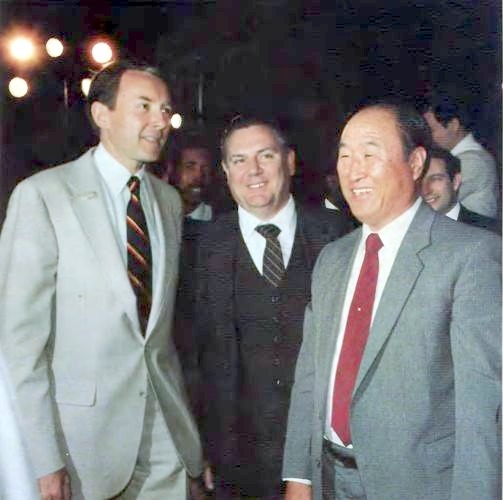
△ Pictured: From left to right: Senator Orrin Hatch, Rev. Everett Sileven, Moon
By Colman McCarthy
February 5, 1984
The Rev. Sun Myung Moon, founder and leader of the Unification Church, is not everyone's idea of the Second Coming. I confess to having had a passing feeling of elation when in May 1982 he was fined $25,000 and sentenced to 18 months in prison for tax evasion and filing false returns. An appeals court upheld the conviction.
I wasn't alone in that feeling. Polls have reported wide hostility to Moon. Perhaps it's his mysterious smile that irks us, because in fact he's as completely normal as any commie-hating, money-loving preacherman at the head table of the town prayer breakfast beating a pious breast when the cameras roll.
Unfortunately for me, I understood more the reasons that Moon was unpopular--his methods of programming recruits, the mass weddings, his real-estate holdings--than I did the reasons the government won its case. Last week, when Moon asked the Supreme Court to review his conviction, some reconsiderations were in order.
First Amendment principles of religious freedom are involved, as well as procedural questions on whether Moon's original trial before a New York jury was fair. What the appeals court described as "troubling issues of religious persecution and abridgement of free speech" has created a unification of believers that only amazing grace or love of the First Amendment can explain.
It is the latter. Some 40 national groups joined the appeal last week as friends of the court. These include the American Civil Liberties Union, the American Baptist Churches, the National Black Catholic Clergy Caucus, the United Presbyterian Church and the National Council of Churches.
This is a Noah's ark of views and styles. Everyone is on board, not to express faith in Moon but to perform the good works of protecting his right to express his Unification beliefs. If his church is under unfair attack this time, someone else's may be next time. The First Amendment forbids the government from nosing into lawful internal church matters, regardless of how odd those matters appear to outsiders. The more bizarre, the more reason for protection.
Moon was prosecuted for not reporting as personal income--and paying taxes on--$162,000 earned as interest, mostly from a Chase Manhattan bank account. The critical question was who owned the money, the church or the church leader. Moon argued that he was the trustee of the money. It was given by church members to be used, through Moon, for their religious purposes. The members had decided, in a legal process, that this was the way they wanted their assets to be managed and used.
Laurence Tribe, a legal scholar and a professor of constitutional law at Harvard, is Moon's chief counsel. In the petition to the Supreme Court, Tribe argued that the religion clauses of the First Amendment are violated when the government decides it is wrong for a church leader to use funds that his followers want him to use.
In United States v. Moon, the government, Tribe writes, "simply proceeded with a theory that ignored Rev. Moon's relationship to his followers; a theory that Rev. Moon's ownership of the assets were in Rev. Moon's name and under his control, and that the assets had been used for what the government deemed Rev. Moon's personal investments and expenditures. This theory treated the intent and religious identity of the assets' donors as wholly irrelevant, and relegated Rev. Moon to the role of an 'ordinary high-ranking businessman'--the very image the government continuously conjured up before the jury."
The national concern generated by this case isn't wasted. Moon's unpopularity is unimportant. Even then, the personal attacks against him are similar in meanness and bias to those vented historically against Jewish, Christian and Moslem leaders when they were newcomers bringing a minority religion into the community. The Unification Church members I know are decent and honest citizens.
The conviction of their leader represents a brick knocked out of the wall of separation between church and state. Every church, and every leader of one, will be more at the mercy of the state if Moon's conviction is allowed to stand.
https://www.washingtonpost.com/archive/lifestyle/1984/02/05/the-real-issue-in-the-case-of-rev-moon/ad8c3905-ccda-4854-a3d5-1a403177dcc1/
Note on this article:
This editorial by Colman McCarthy in the Washington Post portrays Rev. Moon as a victim of oppression. This may appear to be a defense of religious freedom but on closer examination, the biases and class interests become evident. The media is not a neutral and impartial observer, but rather an active participant in shaping public opinion and promoting the interests of those in power. The emphasis on religious freedom in the Rev. Moon case should be seen as part of this larger pattern of deception and propaganda, rather than as a sincere defense of religious liberty.
The media, including the Washington Post, is not a neutral and impartial observer of events but rather an active participant in shaping public opinion. The media is dominated by large corporations and the wealthy, who have a vested interest in promoting their own views and interests. Media outlets often focus on stories and perspectives that align with the interests of their owners and advertisers.
In the case of the Rev. Moon, the Washington Post editorial emphasizes the importance of religious freedom, and the diverse support from civil leaders that Moon received in his struggle for freedom, but fails to mention the financial interests of those who benefited from his release. The fight for Rev. Moon's freedom was not just about religious liberty, but also about the interests of those who financially supported him and the organizations that advocated for his release. This was not just the forming Religious Right and Evangelicals, but also included Democratic politicians, former Civil Rights leaders, the ACLU, the National Council of Churches, as well as other political and civil leaders. They were all paid hundreds of thousands of dollars, in some way or another.
None of what was said in this editorial addresses the constant abuses and mismanagement of funds by religious organizations, which often go unnoticed and unscathed, and how Moon’s victory would likely ensure that they remain unscathed. The emphasis on religious freedom can distract from these important issues and create a false impression of the reality of the situation.
The Washington Post is part of the bourgeois establishment and represents the interests of those in power. Its support of religious freedom can be seen as an attempt to protect the interests of religious organizations, which have significant influence and resources, rather than as an impartial promotion of religious liberty.
#sun myung moon#religious freedom#unification church#moonies#ffwpu#family federation for world peace and unification#washington post#legal#law#1984#unification church history#politics#politicians#national council of churches#aclu#capitalism
2 notes
·
View notes
Text
Attend a Sunday School discussion about PRIDE (2014) this Sunday, June 12
Hey all! I’m facilitating Sunday School at my LGBTQA+ Affirming church this Sunday, June 12, 10 am central time, where I’ll be showing clips from one of my fave films to fuel discussion around solidarity.
Pride (2014) is comedy-drama based off real historical events: the lesbian & gay activists who supported striking miners in 1984 Britain. It’s all about solidarity between unlikely communities who unite to fight a common foe. Content warning for swearing & period-typical homophobia.

[id: screencap from the movie, featuring the front of a Pride march with iconic London buildings in the background. One person has two fists raised in the air, anothers holds a sign, another has a megaphone. There’s a banner visible that reads “lesbians & gays support the miners” / end id]
The event will be hybrid, with some people there in person and others (including myself) there virtually on Zoom.
It’ll last for a little less than 1 hour, so nice and short.
Message me if you want the Zoom link!
Accessibility:
I’ll ask everyone to be muted when they’re not talking to reduce background noise.
Feel free to have your video turned on or off.
The movie clips will be captioned.
I’ll read aloud / describe any questions or images I share.
You’re welcome to participate in conversation as much or little as you like, by speaking or by typing with Zoom’s chat feature.
Let me know if there’s anything else I can do to make the event accessible for you!
Last note:
Grace Presbyterian Church includes people across the spectrum of age, gender, sexuality, and level of knowledge in LGBTQA+ issues; some members are still working to change their language to be as inclusive as possible. You can trust that all attendees really will be speaking in good faith, and don’t intend to cause harm by, say, misgendering anyone.
Still, I know how much misgendering sucks — if that or any other microagressions occur, I will be sure to address it before moving on in the conversation about the film.
#sunday school#all are welcome -- including non-Christians!#i don't think Christianity will be brought up too much for this event -- there will likely be opening & closing prayers tho#and i imagine someone or other may bring up jesus#so be aware of that but know i'll address any comments that are harmful to non-Christians
47 notes
·
View notes
Photo
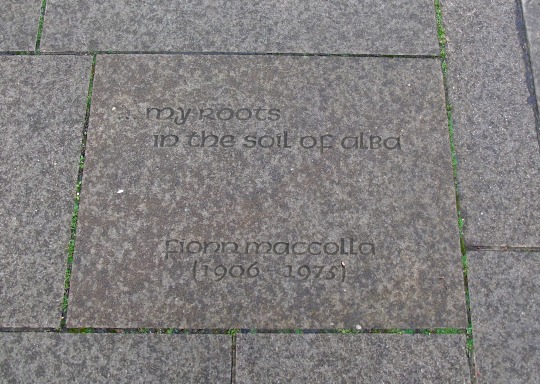
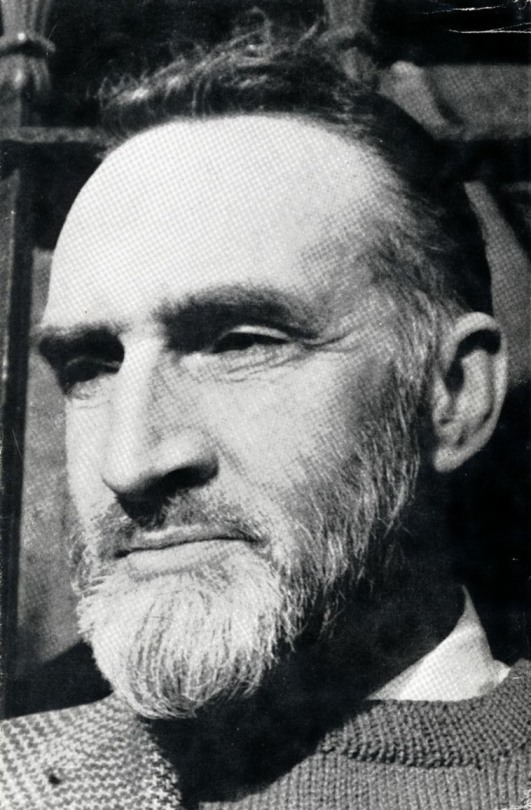
Makars’ Court.
Lawnmarket Royal Mile Edinburgh.
'My Roots in the Soil of Alba' Fionn Maccolla (AKA)Thomas Douglas Macdonald
Fionn MacColla was the pen name of the writer Thomas Douglas MacDonald. He was born and brought up in Montrose, where he became acquainted with Hugh MacDiarmid who edited the 'Montrose Review' from 1919 to 1929, that connection puts him at the cemtre of the Scottish Renaissance of poets in that period. He was also a founding member of the National Party of Scotland from its birth in 1928.
MacDonald was brought up as a member of the Plymouth Brethern. He trained as a teacher in Aberdeen and took up his first post at the age of 19, as a headmaster in Wester Ross. In 1926 he went to Palestine, where he taught in the United Free Church's College at Safed. Returning to Scotland in 1929, he turned towards the Catholic faith and studied Gaelic at Glasgow University for a year.
MacColla's best known novels are The Albannach and And the Cock Crew. His strong views on Scottish Presbyterianism were given philosophical expression in his study At the Sign of the Clenced Fist and in his autobiography, Too Long in this Condition. His novels The Ministers and Move Up John were published posthumously in 1979 and 1994 respectively.
The quote is quite straight forward and t’s from his book The Albanach, a more complete line4 of it reads “Alba, Alba, my own country! That’s it there for you......the land of the people of the blood- my fathesr of the thousands of years, over the face of the world my Roots in the Soil of Alba” The passage refers to traditional among Gaelic families to name the father's son after that father's father.
After nearly 20 years living in the Western Isles, Mac Colla returned to Edinburgh, where he died of heart failure in Edinburgh Royal Infirmary on 20 July 1975 aged 69.
10 notes
·
View notes